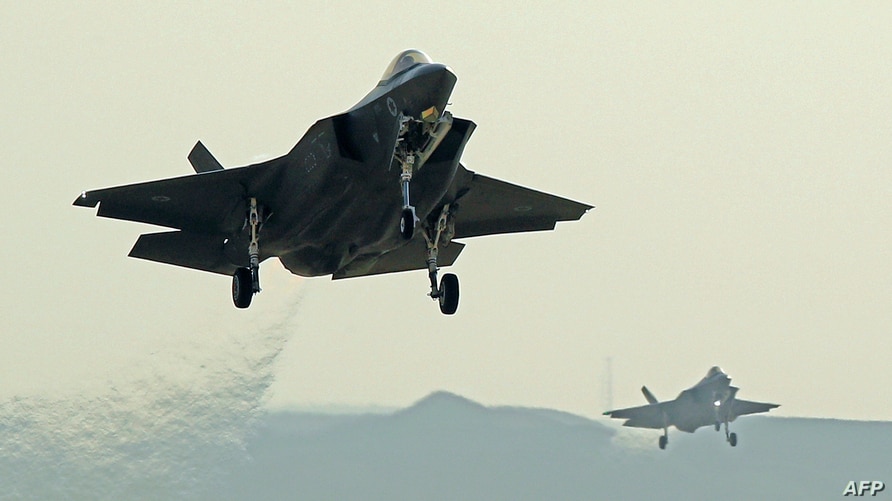Experts: Israel Likely to Continue Attacking Iranian Targets in Eastern Syria
By Sirwan Kajjo
WASHINGTON – Israel is likely to continue its air campaign against Iranian forces and allied militias in Syria, particularly in the eastern part of the country, according to some experts.
In recent months, Israel has increased its airstrikes against Iranian-linked military targets in its war-torn neighboring country.
Iran, a major backer of Syrian President Bashar al-Assad’s regime, has built a significant military presence in Syria since the beginning of that country’s civil war in 2011.
Israel views Iran’s military presence in Syria as a threat to its national security and has carried out strikes against Iranian targets. However, it rarely acknowledges such operations.
Last week, Israeli warplanes reportedly conducted intense airstrikes on eastern Syria, targeting positions and arms depots of Iran-backed forces. Dozens of fighters were killed and wounded in those strikes, local news media reported.
Relocating and hiding
Local observers say following the recent Israeli airstrikes, Iran has relocated its forces and weapons storage to other parts of eastern Syria.
“Their sites have increasingly been exposed to the Israelis, and that’s why the Iranians are moving their forces and munitions to more discreet locations,” said Omar Abu Layla, director of Deir Ezzor 24, a news and research group focused on developments in eastern Syria.
He told VOA that Iran is increasingly entrenching its forces and weapons in residential areas in the city of Deir el-Zour to evade Israeli attacks.
Key site
One of the purported Israeli strikes last week hit an Iranian site near al-Boukamal, a town on the border with Iraq that reportedly is used by Iran as a key point for transporting its weaponry into Syria.
“This acts as a conduit for arms flowing to [the Lebanese Shiite group] Hezbollah and also has a new Iranian base called Imam Ali that consists of warehouses and tunnels near the city,” said Seth Frantzman, director of the Middle East Center for Reporting and Analysis.
“From here, there are pro-Iranian groups stretched out along the Euphrates [river] to Deir el-Zour and also to the T-4 base near Palmyra where Iran has based drones in the past,” he told VOA.
Frantzman said al-Boukamal is a strategically important area “because Iran operated in an unfettered manner here with a variety of militia groups, including militias linked to Iraq and Lebanese Hezbollah,” adding that “the airstrikes appear to target this forest of Iranian infrastructure.”
Continued attacks
Yaakov Amidror, a former national security adviser to the prime minister of Israel, says Israel’s targeting of such locations in recent years has largely delayed Iranian plans to build “an independent war machine in Syria.”
Israel “is doing what is needed to contain the Iranians in Syria, and whenever possible in Iraq and Lebanon,” Amidror, who is now a fellow at the Jewish Institute for National Security of America (JINSA), told VOA.
Given the intensity of the recent airstrikes, analyst Abu Layla said Israel likely will carry out more attacks against Iranian forces in eastern Syria.
“The Israelis have made it clear that their strikes will continue until Iran leaves the area,” he said.
The reported Israeli airstrikes last week were carried out with intelligence provided by the United States, according to a senior U.S. intelligence official who spoke to The Associated Press.
U.S.-backed Syrian Democratic Forces, SDF, is in control of the eastern side of the Euphrates River. The SDF in the past has accused Iran and the Syrian regime of orchestrating attacks against its forces from the western bank of the river.
Iranian officials have not commented on the recent strikes against their forces in Syria.
Russian factor
Russia, a staunch supporter of the Assad regime, says it does not want Syria to be a battleground for a conflict between Israel and Iran.
“If Israel is really forced to respond to threats to the Israeli security coming from the Syrian territory, we have told our Israeli colleagues many times, ‘if you see such threats please give us the information,’” Russian Foreign Minister Sergey Lavrov said Monday at a press conference.
“If you have facts that your state is facing threats from the Syrian territory, report the facts urgently and we will take every measure to neutralize the threat,” he added.
Despite being on the same side of the Syrian conflict, Iran and Russia have different objectives from their respective involvements in the country.
“Russia entered the Syrian conflict in 2015 to protect its strategic and economic interests in Syria, but Iran uses Syria as a platform to expand its regional hegemony and to directly threaten Israel,” said John Saleh, a Syrian affairs analyst in Washington.
“When it comes to Israeli airstrikes against Iranian forces, Russia already has a coordination channel with Israel, but I believe Moscow wants to ensure that such strikes won’t further complicate its own efforts in Syria,” he noted.
Originally published in VOA News

